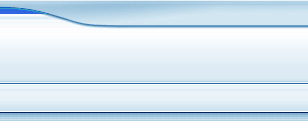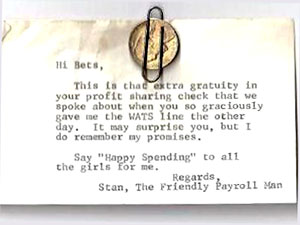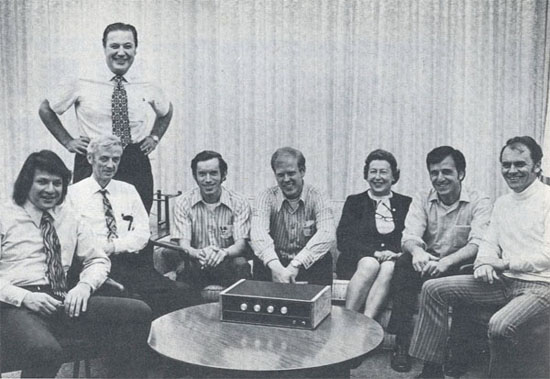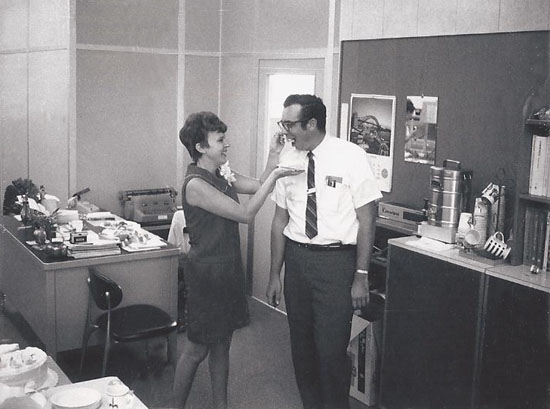HP Memories


In the 1960’s, the Bell System, aka, “Ma Bell, the phone company,” had a monopoly on providing telephone service; the service worked pretty much as follows:
My career at Hewlett Packard almost ended before it began. In 1966, HP was growing fast, and the company needed more PBX equipment and operators to handle the volume of calls at 1501 Page Mill Road, where Corporate Offices were then located. To this end, the company contracted with Western Electric to install a new operator position at the switchboard. The scheduled completion date of this installation was October 21. In mid-September, the project was progressing well and Al Dossolla felt confident that the scheduled completion date would be met. He began to search for an additional PBX operator and, in late September, he offered me the job and scheduled me to start work for Hewlett Packard on October 22.
The ink was hardly dry on that paperwork when Western Electric went on strike. This stopped the installation dead in its tracks and nobody knew when work would resume. Al contacted me to discuss an adjusted start date. I was in a bind since my former employer had already replaced me. So going back to that job was not an option, and with three children to support, I could not afford to be without a salary, even temporarily. Consequently, I would have to reject the HP offer and look for a job elsewhere. Al asked me to give him 24 hours to see if he could work something out and I agreed.
Al solved the problem by having the mail room supervisor give me my basic training and then have me help sort and deliver mail until the switchboard installation was completed. This arrangement allowed me to accept the job at Hewlett Packard. To this day, I’m grateful to Al, because otherwise I would have found another job and missed out on some of the best things in my life - including a wonderful husband.
The strike lasted for six weeks so during that time I worked in the mail room. My mail room duties gave me more mobility and visibility than new operators normally receive. One could say, I learned to network long before others discovered it as a career enhancing option. I never passed up a chance to be out and about around in the plant; I asked questions, I took notes, I absorbed as much information about the company as folks were willing to give me.
My stay in the mail room taught me a few unexpected lessons. I learned what David Packard looked like and that he was a forgiving man. However I learned this only after I had grazed his shin with my mail cart. I was pushing a cart, loaded with mail, around a blind corner in building 5U; at the very instant a tall lanky fellow was rushing around the very same corner. We collided, I apologized, and suggested that he walk a little slower and maybe even speak to Mr. Hewlett about putting a stop sign at this corner. He thanked me for my suggestions and said he would see what he could do.
After he rushed off, a secretary, who had witnessed the exchange, called me over and asked if I knew who that fellow was? When I replied that I didn’t, she said, “Honey, you just met David Packard.” The good news was, a few days later there was a small round mirror mounted at that corner; the better news, he never held my flippant remarks against me.
Hewlett-Packard was not so well known in 1966. We received mail addressed in many comical and unusual ways. Some that I recall are: Hewett Packing Company, Howlets Picking Company, Mr. Hewlett-Packard, Hewlett-Packard Bell Co., and Packard Auto Manufacturing. Mail room employees gave envelopes with unusual addressing to the supervisor after they had opened and processed the contents. One day, I gave such an envelope to my supervisor and instead of laughing and tossing it in the trash, he took it with him when he went for coffee at the 3U coffee station. During the coffee break, he gave the envelope to Mr. Hewlett. Mr. Hewlett, glanced at the envelope, smiled broadly, said, “Thanks, I can use this” and tucked it in his pocket. At a beer bust, the following Friday afternoon, while Mr. Packard was chatting with me and a group of mail room employees, Mr. Hewlett approached him, handed him an envelope, remarked, “I’m glad that I’m Huler” and walked away. I was one of a small group who got the joke; I knew that the envelope was addressed to Huler-Pecker & Company.
Finally, the new switchboard was ready and I moved into the PBX area, which everyone called the operators’ room. This room was tucked into the corner where buildings 3U and 1U joined. It had two points of entry/exit - one from building 3U and one from 1U. These doors provided a handy short cut for executives going from their offices in 3U to Barney Oliver's office in 1U and visa versa and they used it often.
The room was staffed from 7am to 5pm; this meant a minimum of one operator was always on duty at the switchboard during those hours. To accomplish this, the operators rotated lunch and coffee break times. The operators’ break area was adjacent to the switchboard positions. It had a little round table and comfortable chairs, a small collection of telephone directories for various cities and towns in the United States, a water fountain with a hot water tap, a small refrigerator, and a little hot plate. Microwave ovens were not yet in common use - or maybe Art Fong hadn’t yet thought of them. Because the operators’ room was short cut between buildings and the operators were known for sharing their supply of tea bags and goodies from their refrigerator, the area was a popular gathering place; this gave the operators more than average exposure to Mr. Hewlett, Mr. Packard, the VP’s and their staff.
Since the operators provided assistance with so many telephone transactions, there was a real sense of comradeship between the operators and the employees to whom we provided service; this made the operators’ room a fun and exciting place to work. Such as the following:
 |
Stan gave me extra money; but, Ralph Lee took money away from me. Ralph Lee intimidated me; I don’t think he intended to do so, but he did. This feeling of intimidation, plus, my traditional South Alabama upbringing, made it difficult for me to call him anything other than Mr. Lee. On a number of occasions he admonished me, "Don’t call me Mr. Lee; call me Ralph". I was not comfortable doing so and would always revert to calling him Mr. Lee. Ralph Lee was accustomed to having people do as he asked and when I didn’t, he decided fix the situation. Each time I called him Mr. Lee he fined me a dollar and actually stood in the operators’ room with his hand out until I got my purse and paid him. I paid him at least six dollars before I reluctantly began calling him “Ralph Lee.” I never could manage to call him just Ralph, but “Ralph Lee” got me off the hook.
The first Christmas, that I worked at Hewlett Packard, there was a short fat man in a Santa suit wandering around the 3L cafeteria asking employees what they wanted for Christmas. When I was asked that question, I responded; “Bob Boniface.” Imagine my surprise when, about an hour after that encounter, Bob walked in the operators’ room and said, “I heard that I’m wanted in here.” When I recovered from my embarrassment and was able to talk, Bob and I chatted for a few minutes. He asked about my long range plans and I confessed that I didn’t plan to stay with the company for very long. As a single mother, I was saving money so that I could relocate to Alabama and have my parents help me raise my children. Bob wanted to know what it would take to entice me to stay with the company. My flippant reply was, “a good husband.” Little did I know that remark would follow to my 10 year service award lunch.

More Information CLICK HERE |
Barney Oliver and members of the amplifier team gather around the finished product. |
Barney Oliver took full advantage of the operators’ room short cut; he was in and out of the room daily - sometimes multiple times a day. Barney had a reputation for being socially awkward and when he was concentrating on a project or trying to solve a problem he had a tendency to become unaware of his surroundings. This led to many comical Barney Oliver stories among his employees. However, the operators never saw that side of Barney. When he was in the operators’ room and the coffee break bells rang, he would serve coffee and donuts to the operators who were on duty at the switchboard before he ate anything or continued on his way. If he attended a Birthday celebration in the operators break area he made sure the “girls at the board” were served before anyone else got cake.
Another endearing trait of Barney’s was the mother hen attitude he had toward the Public Address system the operators used. This PA system was equipped with Barney Oliver Audio Amplifiers (invented by none other than our Barney). These amplifiers had such superior audio performance that the design was implemented into a build-it-yourself kit that employees could buy. Every time this PA system emitted a snap, crackle or pop, when an operator used an incorrect phrase, or when a new voice came over the air waves, Barney would race to the operators’ room to investigate. One day an operator told Mr. Hewlett about this quirk of Barney’s and he decided to test it out. He had the operator open the paging system key nearest Barney’s office, and instructed her “don’t say anything for just a fraction of a second; then, close the key.” Sure enough, presto, here came Barney on the run! Mr. Hewlett found it very amusing, he waited for a few seconds, while Barney questioned the operators about what happened, then, he confessed that he was culprit.
Very few people realized what a complex process it was to arrange for Mr. Hewlett and/or Mr. Packard to speak to all HP locations, worldwide, via the multiple PA systems at profit sharing times. Twice a year, a small group of employees connected, tested, and maintained a temporary telephone network to support this project. This group included: Gene Doucette, Harvey Zeiber, Leo Leiberman, Art Wittke, Bea Panetta and her staff of PBX operators. Twice a year the operators’ room was turned into the control center for this network. This required that a minimum of 30 telephones to be installed and monitored while the network was activated. Therefore the operators’ room was dubbed “Bea’s Bookie Joint” at profit sharing time.
The switchboard position nearest the door to building 3U was normally reserved for the operator who handled the WATS lines. However, at profit sharing time it had another, very special, use. It was where Mr. Hewlett or Mr. Packard sat to gain access the PA system and broadcast the profit sharing announcement. In addition to helping set up Bea’s Bookie Joint and test the PA system, the operators brought homemade goodies for Mr. Hewlett and/or Mr. Packard to snack on while they sat in the WATS position waiting to make the announcement. Mr. Hewlett would eat the goodies; but, before doing so, he always cautioned the operators, “Flora has me on a diet; but, I’m trusting that you ladies will not to tell on me.” This was an easy promise to keep; we seldom saw or spoke to Mrs. Hewlett.
During business hours only standard, pre-approved announcements were allowed over the PA system without the approval of Ray Wilbur, V.P. of Personnel. Unfortunately, this rule didn’t apply when security guards controlled the PA system, after normal business hours. After 5pm, practical jokers had the guards make some strange announcements, such as: requests to return the “canoodling valve to the impregnation department,” to replace the “left handed wrench in Don Higgins tool box,” or to “ensure that the door is open before attempting to exit the building.” The guards also paged the following people to call the lobby; “Mickey Mouse,” “Donald Duck,” “Yogi Bear,” “I. P. Freely,” “Bea Cool,” “Doctor Pepper,” and, in later years, ET was often asked to “call home.”
On the last work day before Christmas in 1967, the Chief Operator received a request to make an announcement. The request had not been pre-approved. It did not come from an executive and Ray Wilbur was not in town to approve it, therefore the Chief Operator was not going to allow the announcement to be made.
BUT, I had seen the request and liked the text. I have an imp hiding inside me and it gets frisky around the Holidays; so, I decided to take matters into my own hands. I quietly, unplugged my headset, picked up the request, walked out to Dave Kirby’s desk, showed him the request and asked if he thought I would get in trouble for making the announcement. He said “Not likely.” That was good enough for me, if the Director of Public Relations didn’t find the announcement offensive, I considered I was on firm ground. So, without telling the Chief Operator or seeking further permission, I announced over the PA system, “May I have your attention please, will the owner of a red sleigh and eight tiny reindeer, parked atop Barney Oliver’s office in 1U, please remove your vehicle immediately.”
As soon as the announcement was made, applause and a roar of laughter could be heard throughout the buildings. Within the hour, PBX operators from HP locations across the USA were calling to ask about the “HP Christmas announcement,” so they could use it at their site. Thus, an HP tradition was born, it lasted for many years and very few people knew that Ray Wilbur never approved it.
A lot happened for me in 1967, most importantly, I spent time getting to know a co-worker named Vern Haines. We both worked in Corporate Administrative Services (Vern managed the 3L TWX/Telex room). We bowled on the same team in the HP bowling league, we attended work parties and picnics at HP’s Little Basin, sang duets at the piano bar in Rick’s Little Corner, and I fell totally in love. Vern wasn’t as impulsive or as fast moving as I was, but he finally got with the program and, in 1969, he asked me to marry him and we got busy planning a July wedding.
Coincidentally, Ray Wilbur asked Vern to run the picnic at Little Basin the same year we became engaged. This led to my fondest memory of Ed Van Bronkhorst. Ed invited Vern and me to attend an after-work function that he was hosting at the Palo Alto University Club. He needed Vern to give an update on some picnic related expenses. I arrived at the club before Vern did. Prior to this occasion, Vern’s contact with Ed had been by telephone and he had no idea what Ed looked like. When Vern arrived, Ed decided to have some fun. He stepped behind the bar and said, “Hey fella, what are you drinking?” Vern ordered Scotch and water. Ed poured a generous shot of Scotch and handed it to Vern. Vern pushed the drink back and, assuming he was speaking to the bartender, insisted that he wanted Scotch and water. Ed took a pair of tongs, dropped in an ice cube, and pushed it back to Vern and said, “There’s your water.” Vern began to argue that he wanted “real water - not just an ice cube” in his drink. After a few minutes of verbal sparing, Ed asked, “Do you know who I am?” To which Vern replied, “No and I don’t give a damn, I’m not drinking this until you put some water in it.” Ed reached over punched Vern on the shoulder and said, “I’m Ed Van Bronkhorst.” Vern grabbed his drink, took a gulp and said, “Here’s to you, Ed.”
 |
| My husband to be, Vern Haines, was celebrated in the operator's room, prior to our wedding. |
In 1969, Vern and I were on the committee that arranged an annual picnic at San Felipe Ranch, a ranch in the San Jose/Gilroy foothills, owned by Mr. Hewlett and Mr. Packard. Committee members reported to the ranch the day before the picnic to help the ranch hands prepare for the event. Tradition was that each committee member brought a sleeping bag and slept at the ranch that night. Each person grabbed sleeping space - on a first-come, first-served basis - and any bed, any floor space in the bunk house or ground by the swimming pool was fair game.
Just about sundown, the foreman announced that he had received a call from Mr. Packard, who was serving as Assistant Secretary of Defense and living in Washington, DC. Mr. Packard informed the foreman that there were newlyweds on the committee and requested that they sleep in his room at the ranch. I never learned how Mr. Packard knew that Vern and I had married (I suspect that Packard’s secretary and my buddy, Margaret Paull had a hand in it). Regardless of how he knew, his kindness made the 1969 San Felipe Ranch picnic a remarkable experience.